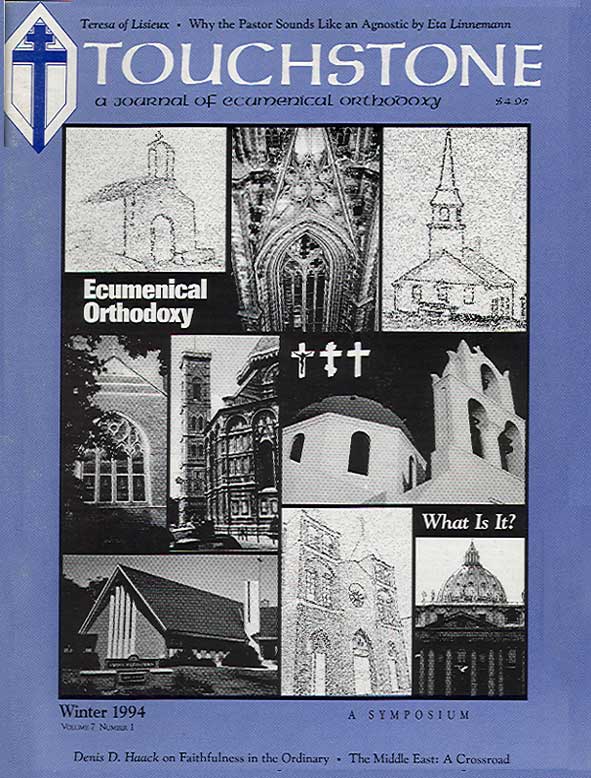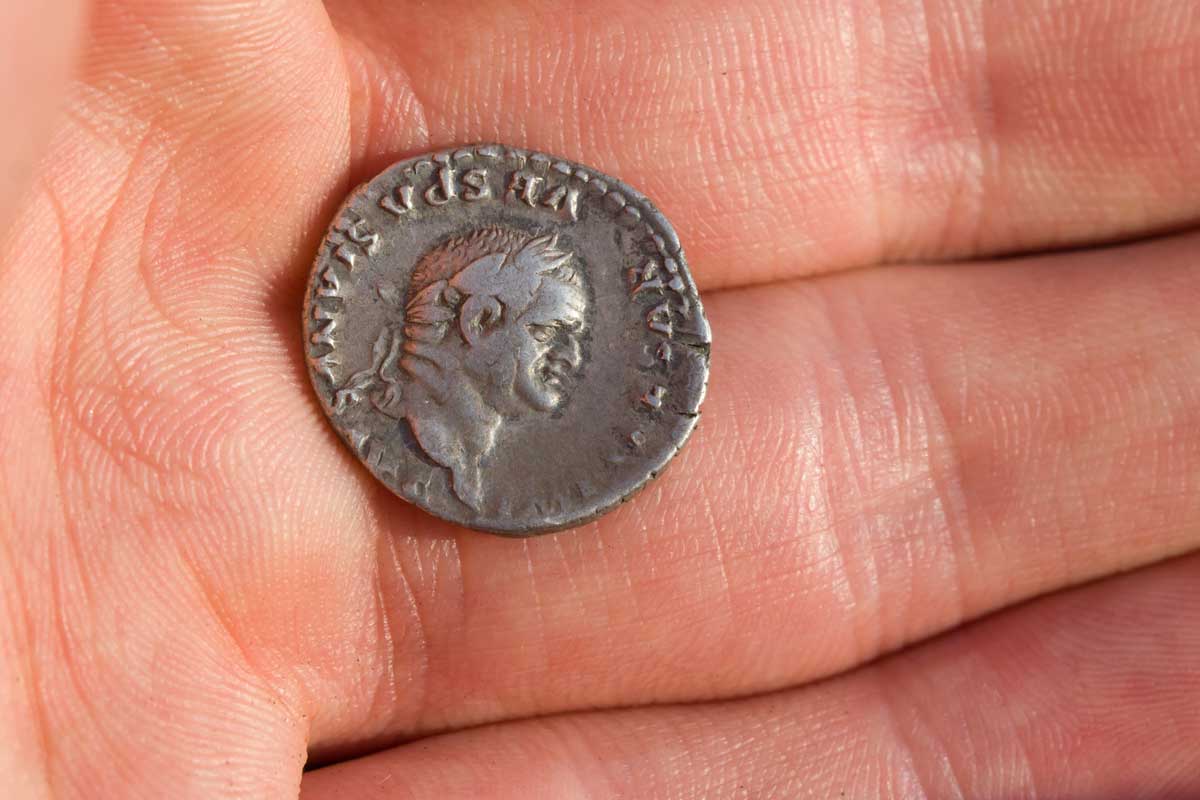Evangelicals Confront the Church Catholic
The Body: Being Light in the Darkness
by Charles Colson with Ellen Santilli Vaughn
Dallas: Word Publishing, 1992
(455 pages; $ 17.99, cloth)
One Lord, One Faith: A Theology for Cross-Denominational Renewal
by Rex Koivisto
Wheaton, IL: Victor Books/SP Publications, 1993
(408 pages; $19.99, cloth)
reviewed by S. M. Hutchens
In his 1978 book Fundamentalism, James Barr says that in a certain sense evangelicalism is a theology-less movement. This observation has an element of truth, but is perhaps a bit misleading. Evangelicalism is, after all, a movement, and one doesn’t usually look for the same kind of theological coherence in movements one expects in more defined institutions. Much of its theological fogginess may, moreover, be traced back to one of its coherencies—its essentially ecumenical character. As disunited and sectarian as it can appear to those who stand without, evangelicalism is to a large degree a unifying movement with strong aspirations to historical orthodoxy. The various Protestant traditions within evangelicalism are united not only by opposition to modernism but also (here we must whisper) by allegiance to the rule of faith set forth in the ecumenical creeds. The reason this must be said quietly is because many of the assemblies of which the movement is composed, while producing statements of faith, manifestoes, calls, articles of association, and covenants by the score, are quite sure they don’t believe in creeds.
This sort of Protestantism has a difficulty with creeds, as J. W. Nevin observed, because creed implies Church, that is, an external authority structure in history and tradition that would quickly call the “distinctives” of its various members into serious question. Evangelicals have a problem with the Church. Among them the Church is a body, but does not have a body. St. Paul’s portrait of the Church as a body whose head is Christ is appreciated, but there is little desire to explore the other main biblical image of the Church as his consort, that is, as a person with a being distinct from his, whom he loves, whose voice he hears and considers, and through whom he exercises his authority.
It is his recognition of the body of the Church in this second sense that makes Charles Colson a loose cannon on the deck of the evangelical bark. Or at least he could be this if what he is saying in The Body is heard. In this book he has taken the first step necessary toward recognition of a prescriptive and authoritative catholic tradition: assertion of the existence of the Church beyond the aggregate of churches. By noting the lack of both popular and scholarly work on the subject among evangelicals he places the blame for a low view of the Church and the widespread ignorance of its significance on the movement’s leaders. At first blush he would seem justified in his fears that his intention to “expound the great doctrine of the church, inspire the grand vision of the church, and restore a high view of the church” will take him “through doctrinal and denominational minefields” and set off some explosions in the process. Well, it should, but I doubt that it will.
To be sure, proposing that there is a constitutional defect in the movement to which one belongs, and suggesting that the fault is perpetuated by the people who write its books is normally no way to keep one’s welcome. But as right as I think Mr. Colson is in his estimate of evangelicalism on this account, I think he is wrong about setting off the mines. He will make it through unscathed and remain an important evangelical, if an evangelical he chooses to remain. For in this gentle book of anecdotes and low-key teaching demonstrating the existence and character of the Church Catholic, he has not spoken loudly enough to run wide of evangelicalism’s amazing tolerance for those it wishes to regard as its own. (If the movement could endure Franky Schaeffer, it can surely put up with Charles Colson.) The Body will be treated as an interesting opinion of Colson’s, and yes, yes, we really do need to pay more attention to the Church—and that will be that. Nothing much will come of it unless it combines with other forces to break the strong back of evangelical sectarianism—so strange a back in a beast that has in many ways so catholic a heart.
While The Body is Charles Colson’s effort to demonstrate the concrete existence of a Church that spans denominational lines, Rex Koivisto attempts a far more difficult feat—to pave the way for cross-denominational renewal by providing a theology for “relational unity,” a unity in which denominational distinctives are retained, but within which Christian cooperation can grow from agreement on a core orthodoxy. This is an appealing idea, but most readers of Touchstone will probably find his One Lord, One Faith—a well-researched book containing many good observations and much practical wisdom—a great deal less than the treatise on catholic and ecumenical theology it tries to be. I would suppose it is difficult for most people for whom the adjective “catholic” has historical weight to endorse a perspective that treats Roman Catholicism and Eastern Orthodoxy as just two more competing Christian sects (and fairly dim ones at that), places Protestant evangelicalism at center stage in the play of Christian history and doctrine, and finally suggests that the best way to realize a properly ecumenical Church is to emulate the Plymouth Brethren on a universal scale. These are strange qualities in a book that claims to be “about catholicity . . . the great universality of the church as the body of Christ.”
Even this, however, could be placed to the side as an interesting distraction if One Lord, One Faith made an important contribution to the theology of Christian reconciliation. Alas, it cannot, for there is a contradiction at its theological center. In a chapter titled “Biblical Hermeneutics as the Key to Tradition and Catholicity” Koivisto tries to reconcile the evangelical (I am not willing to say Protestant) and Catholic minds on the central and divisive issue of authority. Compare these statements found at the chapter’s beginning and end:
Protestants simply do not allow the teaching office to have the final say. The text [of scripture] itself is the final authority, and the only appeal is to objective standards of literary interpretation used with any similar literature (154).
I would like to suggest that a key factor here is learning to practice community exegesis. We must allow the thinking of others outside our [denominational] traditions to become involved in the confirmation of our own interpretive processes. . . . As I understand the role of my own tradition with both its strengths and limitations, I am pushed outward to appreciate and learn from the traditions of others (172-173, italics Koivisto’s).
S. M. Hutchens is a senior editor and longtime writer for Touchstone.
subscription options
Order
Print/Online Subscription

Get six issues (one year) of Touchstone PLUS full online access including pdf downloads for only $39.95. That's only $3.34 per month!
Order
Online Only
Subscription

Get a one-year full-access subscription to the Touchstone online archives for only $19.95. That's only $1.66 per month!
bulk subscriptions
Order Touchstone subscriptions in bulk and save $10 per sub! Each subscription includes 6 issues of Touchstone plus full online access to touchstonemag.com—including archives, videos, and pdf downloads of recent issues for only $29.95 each! Great for churches or study groups.
Transactions will be processed on a secure server.
more from the online archives
calling all readers
Please Donate
"There are magazines worth reading but few worth saving . . . Touchstone is just such a magazine."
—Alice von Hildebrand
"Here we do not concede one square millimeter of territory to falsehood, folly, contemporary sentimentality, or fashion. We speak the truth, and let God be our judge. . . . Touchstone is the one committedly Christian conservative journal."
—Anthony Esolen, Touchstone senior editor










